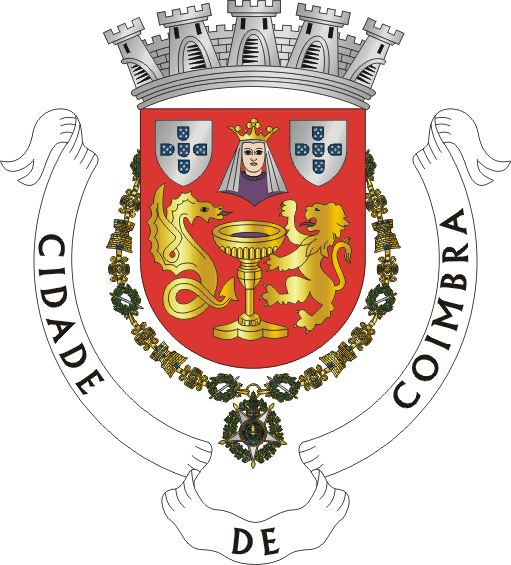Coimbra
| Heraldry of the World Civic heraldry of Portugal - Brasões dos municípios portugueses |
COIMBRA
District : Coimbra
Official blazon
Escudo de vermelho, com uma taça de ouro realçada de púrpura, acompanhada de uma serpe alada e um leão batalhantes, ambos de ouro e lampassados de púrpura. Em chefe, um busto de mulher, coroada de ouro, vestida de púrpura e com manto de prata, acompanhada por dois escudetes antigos das quinas. Escudo cercado pelo Colar da Ordem de Torre e Espada. Coroa mural de prata de cinco torres. Listel branco, com os dizeres : " CIDADE DE COIMBRA ", de negro.
Origin/meaning
The arms were officially granted on November 14, 1930.
For the "lady" in the arms there are two explanations; one states that she is the patron saint of Coimbra, the Sainted Queen Isabel, wife of King Dinis, renowned in Portugal for her miracle of the roses. The second explanation states that she represents an old Suevic princess named Cindazunda. This is related with a legend that occurred during the reconquest of Portugal from the Moors.
The serpent is the symbol of wisdom, and, together with the goblet (the Holy Grail of the Quest) symbolise the city's university. Coimbra prides itself in being one of the oldest Universities in Europe (founded by the Isabel's husband Dom Dinis).
The twin shields on either side of Isabel, in today's Arms, are the ensigns of Afonso Henriques, Portugal's first monarch, who also made Coimbra his capital.
Freguesias in Coimbra :
- Botão
- Brasfemes
- Castelo Viegas
- Eiras
- Ribeira de Frades
- Santa Clara
- Santo António dos Olivais
- São João do Campo
- São Martinho do Bispo
- Souselas
- Taveiro
- Torres do Mondego
- Trouxemil
Contact and Support
Partners:
Your logo here ?
Contact us
© since 1995, Heraldry of the World, Ralf Hartemink 
Index of the site
Literature : Information provided by Carlos Cordeiro (ccordeiro@coneddev.com) and Branca Gonçalves (second explanation).










